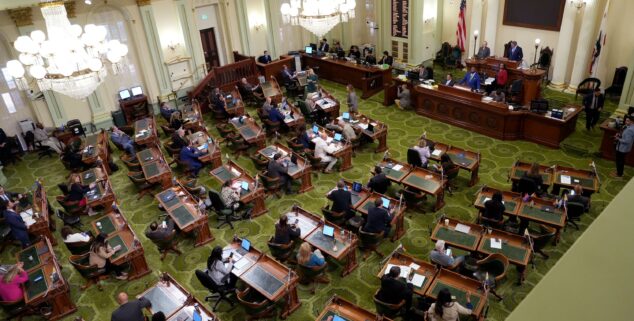Capitol Briefs
Capitol Briefs: Bills on the move and some legislative stats
 The California Assembly in session. Photo by AP
The California Assembly in session. Photo by APIn the latest edition of Capitol Briefs, we showcase movement on a handful of measures flying under the radar and share some interesting legislative stats compiled by lobbyist and regular Capitol Weekly contributor Chris Micheli.
New law allows health officials to inspect private detention facilities: Gov. Gavin Newsom has signed Senate Bill 1132, a bill that allows county health officers the authority to enter and inspect private detention facilities, including six for profit detention facilities in California.
According to a press release from the Immigrant Defense Advocates, private detention facilities pose a public health and individual health risk including Covid-19 outbreaks and workplace safety violations.
“SB 1132 sends a clear message that California will protect the health and safety of everyone in our state, and underscores that public health should always be prioritized over private profit,” said Jackie Gonzalez, Policy Director with Immigrant Defense Advocates, a sponsor of SB 1132 said in a press release.
The bill will go into effect on Jan. 1 next year.
AB 1983 moves to governor’s desk after 39-0 senate vote: Assembly Bill 1983 passed unanimously in the California Senate and is now awaiting Gov. Gavin Newsom’s signature.
AB 1983 reinstates a voluntary tax-check off program allowing Californians to give a portion of their state tax refund to programs offering low- and no-cost spay and neuter services.
The program ran for 8 years expiring at the end of 2023 and will continue to be run by the California Department of Food and Agriculture with funds raised from the Pet Lover’s Specialty License Plate Program.
If signed into law the bill will go into effect next year on Jan. 1.
Legislative Women’s Caucus elects chair and vice-chair for 2025-2026 term: The Legislative Women’s Caucus (LWC) elected Assembly Majority Leader Cecilia Aguiar-Curry (D-Winters) and Senator Monique Limón (D-Santa Barbara) as its Chair and Vice-Chair, respectively.
According to a caucus press release, the LWC anticipating the growth of its membership from 50 members to 58 members next year reaching gender equality in the Senate.
The Caucus leaders are elected every two years with the positions of Chair and Vice Chair alternating between the Senate and Assembly each cycle.
The two-year term begins in December 2024.
SB 357 passes in Senate to change medical reporting to DMV: SB 357 was approved by the Senate and is now on its way to Gov. Gavin Newsom.
The bill authored by Senator Anthony Portantino (D- Burbank) would allow doctors the discretion to report patient conditions that they believe would impair their ability to drive.
Due to a 1957 state law, California requires physicians to automatically report conditions to the Department of Motor Vehicles.
The law would remove language that discriminates against specific conditions, including epilepsy and provide immunity for doctors who report or don’t report patient conditions to the DMV.
If signed, the bill would take effect Jan. 1, 2030.
Bill expediting licensure for gender-affirming health care providers moves to governor’s desk: AB 2442 has passed both Legislative houses and is now waiting to be signed by Gov. Gavin Newsom.
The bill fast-tracks the processing of licenses for healthcare providers in California who are committed to providing gender-affirming care in their respective fields.
The bill, sponsored by Planned Parenthood Affiliates of California and Equality California, “is a necessary response to strengthen California’s network of affirming healthcare,” bill author Assemblymember Rick Chavez Zbur said in a statement.
Gov. Newsom has until Sept. 30 to sign the bill into law.
The Capitol by the numbers: Lobbyist and regular Capitol Weekly contributor Chris Micheli has compiled a trove of raw numbers summing up the 2023-24 legislative session. Some of the highlights:
- Lawmakers have introduced 4,821 bills over this two-year session
- Of those, 3,291 have come in the Assembly and 1,530 in the Senate
- Of those bills originally referred to one of the Legislature’s 56 standing committees, 341 were introduced in the Assembly Committee on Public Safety
- The next highest total of referrals came in the Assembly Committee on Health, with 251 bills. The Assembly Committee on Education was next with 206 bills.
- In 2024, 499 bills introduced in the Senate (78 percent) cleared that chamber by the crossover deadline; 933 bills (61 percent) did so in the Assembly. Final totals of how many of each cleared the other chamber and made it to the governor is TBD.
- In 2023, 659 (74 percent) made it out of the Senate by the crossover deadline, with 381 (58 percent) also gaining approval in the Assembly.
- In 2023, 1056 bills (60 percent) made it out of the Assembly by crossover, with 665 (63 percent) also clearing the Senate.
- Based on data accumulated since 2007, the Senate on average passes 62 percent of the bills introduced in that chamber each year, while the Assembly on average passed 57 percent of the bills introduced there each year.
Capitol Weekly intern Mahrukh Siddiqui contributed to this story.
Want to see more stories like this? Sign up for The Roundup, the free daily newsletter about California politics from the editors of Capitol Weekly. Stay up to date on the news you need to know.
Sign up below, then look for a confirmation email in your inbox.

Leave a Reply